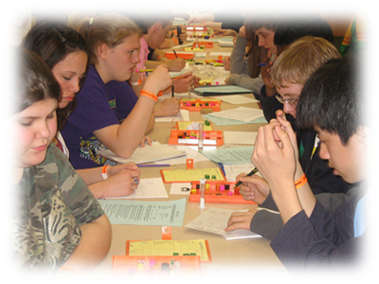
by Gamer | Games, Propaganda
If you have read the definitions for a section, you are now ready to play PROPAGANDA. The rounds are set up just as they are for real competition, complete with a timer for each question. For these practice rounds the...

by Gamer | Games, Propaganda
What Do Players Learn? While playing PROPAGANDA, players learn to recognize techniques of persuasion that are often used by advertisers, politicians, editorial writers, and in normal human interaction. Players increase their ability to discern the truth from...

by Academic Games Admin | Propaganda
Techniques of This Section 1. Diversion 2. Disproving a Minor Point 3. Ad Hominem 4. Appeal to Ignorance 5. Leading Question 6. Complex Question 7. Inconsequent Argument 8. Attacking a Straw Man 9. Victory by Definition 10. Begging the...

by Academic Games Admin | Propaganda
Techniques of This Section 1.Concurrency 2. Post Hoc 3. Selected Instances 4. Hasty Generalization 5. Faulty Analogy 6. Composition 7. Division 8. Non Sequitur I greatly enjoyed Stephen King’s Pet Sematary so you can be sure that his newest effort,...

by Academic Games Admin | Propaganda
Techniques of This Section 1. Appeal to Pity 2. Appeal to Flattery 3. Appeal to Ridicule 4. Appeal to Prestige 5. Appeal to Prejudice 6. Bargain Appeal 7. Folksy Appeal 8. Join the Bandwagon Appeal 9. Appeal to Practical...

by Academic Games Admin | Propaganda
Techniques of This Section 1. Appearance 2. Manner 3. Degrees and Title 4. Numbers 5. Status 6. Repetition 7. Slogans 8. Technical Jargon 9. Sophistical Formula Attendance at religious services is a must to be successful in this world. All...

by Academic Games Admin | Propaganda
Techniques of This Section 1. Emotional Terms 2. Metaphor and Simile 3. Emphasis 4. Quotation Out of Context 5. Abstract Terms 6. Vagueness 7. Ambiguity 8. Shift of Meaning Acme Paper Products President: “Our long term commitment is to increased...

by Academic Games Admin | Propaganda
Techniques of This Section 1. Prejudice 2. Academic Detachment 3. Drawing the Line 4. Not Drawing the Line 5. Conservatism, Radicalism, Moderatism 6. Rationalization 7. Wishful Thinking 8. Tabloid Thinking 9. Causal Oversimplication 10. Inconceivability The accident...












